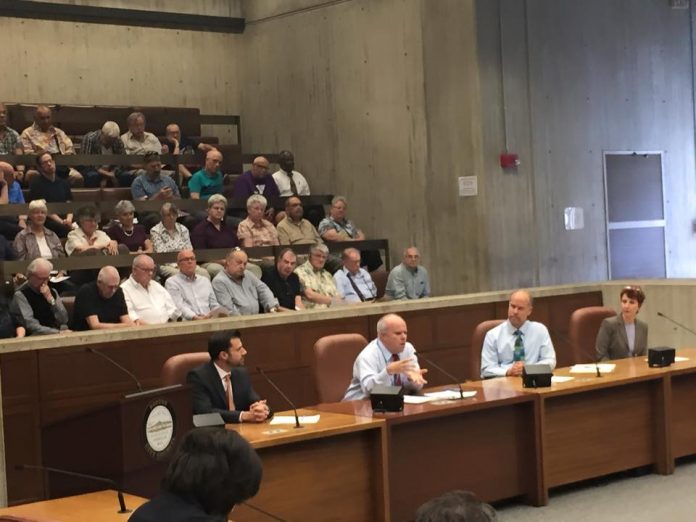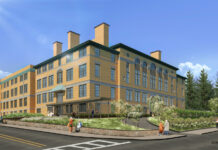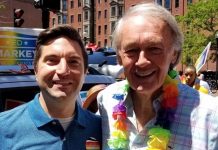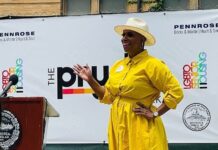
In the first of what LGBT elder advocates hope will be many public hearings, the LGBT Aging Project joined Boston City Council members, city officials, and Boston residents on May 7 at City Hall to discuss the need for affordable LGBT senior housing. Boston City Councilor Josh Zakim, Chair of Boston City Council’s Human Rights and Civil Rights Committee, oversaw the proceedings, which included testimony from LGBT seniors who have struggled to find safe, affordable, and LGBT-friendly housing options in Boston.
LGBT Aging Project Director Lisa Krinsky and Assistant Director Bob Linscott took to the microphone to emphasize why affirming housing is so critical to the survival of LGBT seniors. As Krinsky told the City Council members in attendance, LGBT seniors very often live alone, are estranged from their biological families, are childless, and struggle to find and maintain support networks. In a sobering statistic, she noted that half of all Americans living with HIV/AIDS are over the age of 50.
Linscott stressed that LGBT-friendly housing isn’t about isolating LGBT seniors from the rest of the senior population. “When LGBT seniors know that they have an established, safe LGBT space available, they often feel the strength and confidence needed to eventually integrate themselves into the larger community,” he said.
Krinsky testified on the success of the LGBT Aging Project’s cultural competency workshops in assisted living and care residences. Educating not just staff, but also non-LGBT residents, on LGBT issues is shown to greatly reduce incidents of discrimination and homophobic language. Unfortunately, Krinsky explained, this sort of cultural competency training is not mandatory for all elder care facilities.
Robb Johnson, Fenway’s Associate Vice President of Special Projects, testified that earning the trust of LGBT seniors is another crucial step toward successful housing options. Many of these seniors have felt pressured to go back into the closet in order to receive better care, he said, and so are hesitant to enter housing that isn’t LGBT exclusive. Senior housing that is exclusively for LGBT people is rare but slowly growing in the U.S., with residences popping up in cities like Los Angeles, Cleveland, Philadelphia, and Chicago.
Dozens of LGBT Bostonians showed up for the hearing in a strong show of support for affordable housing, and several took the podium to share their stories, fears, and hopes. Michelle Lord recounts how she encountered barriers to accessing housing as a transgender person, because her birth certificate and driver’s license information differed. When she tried to explain her gender identity, she was met with dismissive and rude remarks from residency staff.
Marianne Costello, a longtime resident of JP, expressed her fear that entering senior housing would mean becoming isolated from the LGBT community that had supported her throughout her life. “I don’t want to have to go into senior housing and leave the LGBT community,” she said.
Senior John Kelly told the story of how, after being outed in an article, he experienced physical and verbal threats from his assisted living center’s staff and other residents. “As a gay senior, you always wonder if you’re safe and if you can be out,” he explained. “You’re never sure if you can safely be who you are.”
We at Fenway Health and the LGBT Aging Project hope that this public hearing is a first step towards accessible, affordable, and affirming housing for all our seniors.
Want to receive email updates about what’s happening at Fenway Health and the LGBT Aging Project? Sign up here.








